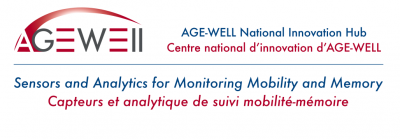
NRC Canada
Project 1: AI-enabled cough detection and multimodal contactless vital signs monitoring
2020 – 2021
Project goals:
- AI-enabled cough diagnostics: Cough is a symptom and mechanism for COVID-19 and viral spread. This project aims to distinguish cough types (dry, wet, wheeze and whooping) with data-driven approaches on previously collected cough data. Collaborating with the NRC team to integrate the models within a system for clinical validations. The COVID-19 cough will be explored to understand if there are unique features. The team will collaborate with other research organizations to obtain relevant data.
- Multimodal contactless vital signs monitoring: Thermal and RGB imaging has the potential to be used for non-contact assessment of vital signs (heart rate and respiration rate) through measurement of small changes in temperature or skin colour. The team has prior experience using thermal and RGB cameras within residential settings and will apply this to public space applications. The team will compare the performance of the cameras individually and in combination using existing datasets.
PI: Rafik Goubran
Publications
Project 2: Integrated Decision Support for Health and Safety
2021 – 2024
Project goals: Healthy and safe aging in place requires a continuous assessment of well-being. Automating this assessment is a cost-effective solution that reduces the burden on family members and caregivers. This project proposes deploying ambient sensors in the home and using an integrated decision support system to combine the information from these sensors and assess the health and well-being of the home occupant. The system will monitor cough, vital signs (heart rate, breathing rate) and daily activities using data analysis, deep learning and machine learning methods. The result is an integrated decision support software system that can detect any decline in health conditions, help in the early detection of diseases and enable early intervention. The project will lead to a cost-effective approach to enable aging in place by providing high-quality healthcare, reducing the burden on family members, and reducing the need for long term care, in support of the NRC AiP program.
PI: Rafik Goubran
Publications
Project 3: Speech and eye-movements analysis for the remote early detection of diseases associated with aging
2022 – 2025
Project goals: Early identification of cognitive decline allows for earlier intervention with appropriate care so that entry to long term care can be delayed. This project explores two non-invasive assessments (eye-tracking and speech patterns) that have potential for cognitive assessment. Specifically, the project will design a system to capture voice and eye-gaze data during tasks, with the goal of detecting speech and oculomotor abnormalities associated with cognitive decline. It will combine the two modalities and leverage multimodal analysis techniques to generate more sensitive predictions. The project will analyze combinations of tasks to achieve the assessment. The project will collect longitudinal data, to allow intra-subject analysis in addition to cross-sectional analysis to validate the performance of the system. The project will lead to a more cost-effective approach for assessment that could be done at home or remotely and that is an alternative to more expensive or invasive diagnostic testing currently being done.
PI: Frank Knoefel
Publications
Project 4: Sensor networks for safe and engaged mature drivers (SENSE-MD)
2022 – 2025
Project goals: Aging in place has many benefits. Older Canadians often need to drive in order to take advantage of these benefits as a consequence of Canada’s climate and geography. Aging brings natural and illness-related health declines putting mature drivers at risk for driving accidents. Furthermore, the unplanned cessation of driving causes isolation, leading to increased risk of dementia, poorer physical and mental health, and reduced ability to engage in social and physical activities. This project aims to provide a solution for a key missing element in the current driver assessment regime: knowledge of changes in risk and driving capacity based on valuable data from onboard vehicle sensors. Clinical assessments are infrequent and only indirectly measure driving skills, increasing risks for premature driving cessation and isolation. The SENSE-MD project will offer a technology-based solution that delivers information to the driver regarding changes in risks. This information can also be shared with families and caregivers as appropriate.
See the project web page. www.sense-md.ca
PI: Chris Herdman
Publications
Project 5: SAM3 SME Support for Aging in Place Technology CTO
2023 –
Project goals: The objective of the project is to accelerate the growth of Canadian SMEs in the AgeTech ecosystem by providing services to test Aging in Place technologies. The Organization will utilize the specialized expertise, facilities, and equipment of the Sensors and Analytics for Monitoring Mobility and Memory (SAM3) Innovation Hub, founded by Carleton University, the Bruyère Research Institute and the AGE-WELL National Centre of Excellence.
See the CTO web page https://carleton.ca/sam3/nrc-irapcto/
News
